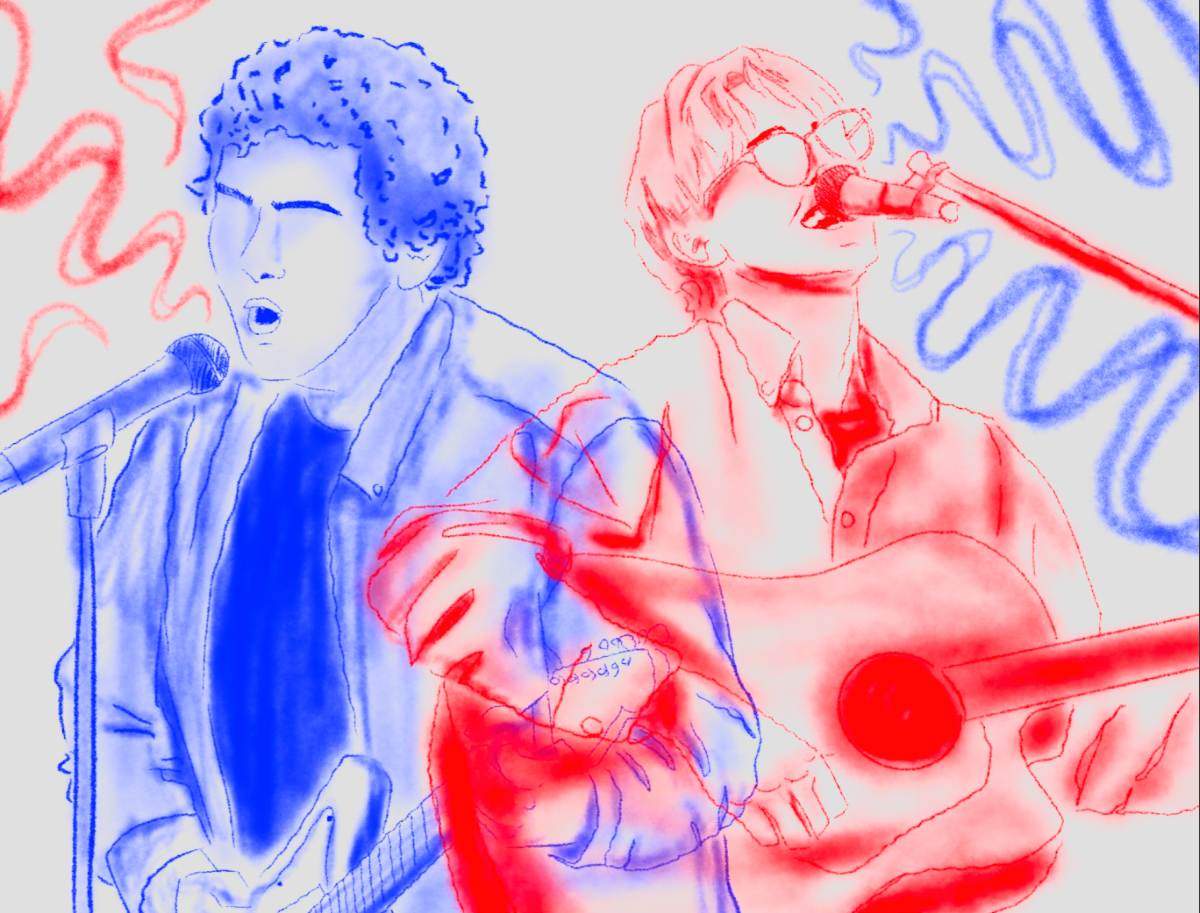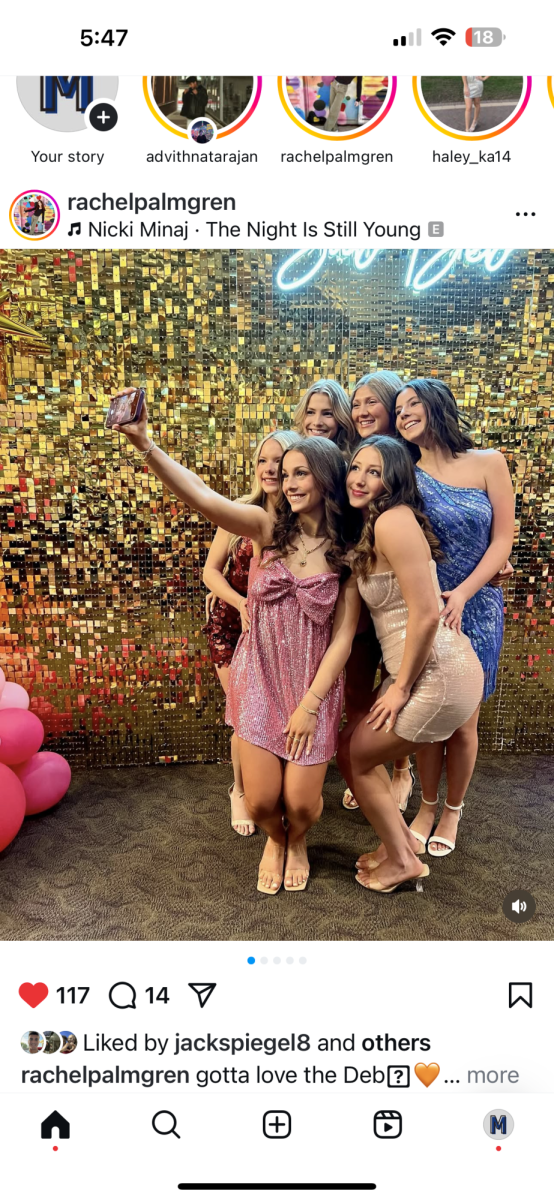Element of the unexpected
When teachers talk together
May 4, 2016
Two of Manhattan High School’s english teachers, Brad Ficke and Susan Dils, were brought together one afternoon to discuss their second jobs and their lives as teachers. Ficke has been painting and doing light construction for 16 years while Dils has worked as a licensed zumba instructor to keep dance in her life.
Why did you decide to take on these jobs?
Ficke:
I don’t sit still very well… so summers off have never ever been summers off and… If we wanted to do anything extra outside of what that income or combining income would allow we needed more money. [My wife and I] could’ve survived without those jobs, but then again, if we wanted to take vacations, if we wanted cars that actually worked, if we wanted some of the luxuries of life then we needed more money.
Dils:
It’s definitely nice to have that extra money and being able to do something that I love… it can be a pretty hit-and-miss, but when I do get that money it’s nice.
What is life as a teacher like daily?
Ficke:
There’s always an element of the unexpected. Life everyday as a teacher for me is pretty all-consuming. I think about it when I’m done teaching, I think about it when I wake up. I would say kind of a day in life of a teacher is whatever you’re doing, whatever your expectations are, what needs to be done. At least for an English teacher because that’s all I’ve ever done, it’s pretty much 24/7.
Dils:
Yeah, I would have to agree with that it is 24/7. You get up in the morning you just have to be ready to take on whatever’s coming your way… over the years it’s become a little bit more predictable but within that there’s still the element of the unknown, which I think makes it an exciting job.
Ficke:
And it gives you lots of opportunities, I don’t think any teacher I know teaches just because they want to convey their curriculum. They want to be around people and make a difference in people’s lives and no other job I can think of provides as many daily opportunities as teaching does to do that, to affect people. Hopefully positively.
Have you ever had second thoughts about your decision to become a teacher?
Ficke:
Not long lasting thoughts. Occasionally I get frustrated but I feel like I can’t see myself doing anything else. I’m capable of doing other things, but I really feel like I need to be in the classroom for multiple reasons. So, it does get frustrating, but I always end up coming back to this is where I need to be.
Dils:
Same for me, there those moments of frustrations and you start thinking, ‘what else can I can do, is there something less stressful, make more money.’ But I, too, always come back to teaching at the end of all of it, because that’s where I’m meant to be.
What do you think about teachers’ salaries?
Ficke:
I’ll be honest with you, I don’t really think that they’re unfair. If you figure it in as a seven-and-half or an eight-hour day, and if you think about how much time we work in the course of a year and we get paid over 12 months, it probably does seem pretty logical and a pretty fair salary and I think one thing people don’t understand though about teaching is that the only way to make more money is ultimately pay more money. For example, I spent about $11,000 when I earned my master’s and it took me seven years to break even. I think what we’re making is okay. On the other hand, the opportunity to make more costs money.
Dils:
I know as a teacher I wish I made more money. I’m glad I have a master’s degree because that definitely helps, but you’re paying for it. You’re not necessarily getting it all back.
Ficke:
And I think the American culture says, ‘the harder you work, the more money you can make.’ and that’s not really true in teaching. You can work really really hard, and provide good education for your students, and not really see monetary outcome from that.
What role do you think teachers play in our society?
Dils:
As teachers we probably have one of the most important jobs, because we’re helping students figure out who they are as people, what they want to do with their lives, what kind of people they’re going to be in society. And as teachers, we just hope that we can make a difference, that we can influence that in some way. It’s not necessarily about our content areas; we all have our specializations, but it’s the larger lessons…I think it’s just a dress rehearsal for the rest of your life.
Ficke:
I would agree with that… Your responsibilities become more than a curriculum, they become helping [to] raise that kid, and to get to know them. The public education system feeds kids, looks out for their mental health, looks out for their physical health, looks out for their academics, looks out for them as people. It’s a huge responsibility and anybody who thinks it’s just academics has no idea.
How do you think society perceives teaching as a career?
Ficke:
I feel like any job that you don’t do, you don’t really understand the workings of, but I think that everybody has been in high school, everybody has been a student. So teaching, more than any other profession, people like to think they know about the profession. But until you actually teach, I don’t think you know. I think most people don’t know the extent of the responsibilities of teaching, and really how much preparation it is if you want to teach well.
Dils:
It’s true. People think they know what’s involved with teaching because of their experience as a student. I think about how many times people say to me, ‘oh, you get your summer’s off, and all of this vacation time’ and this misconception that ‘oh it’s an easy job.’ It’s not, it’s a huge responsibility and I think that people don’t necessarily understand it. I’ve talked to people before in other professions who visited classrooms and they’re always amazed at the amount of things we have to do, the amount of decisions that we have to make in any given time. Our minds are constantly going; we’re thinking about students and curriculum and helping people and what we are doing tomorrow, what we are doing next week.
What makes you get up in the morning to come to school and teach?
Ficke:
I felt I could’ve been more prepared for what came after high school, so … I want to provide my students with an advantage that I maybe didn’t have. My faith gets me out of bed every morning because I want to be a witness to being kind and caring for people but in a realistic way.
Dils:
I always think about teachers that I had when I was in school … and the impact those teacher had on me. I still think about them to this day. I have a responsibility to be here for [the students] and be… that sense of support sometimes that students need, not just academically. Also, my faith, as well, because teaching… is extremely challenging and frustrating and you have to believe in the higher purpose that I’m called to this and I’m helping somebody… I’m doing everything outside of myself.



